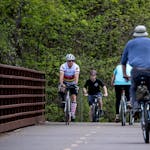As a young man, if Dean Petersen could legally hunt it, he was hunting it. Sometimes he was in Wyoming or the Black Hills.
Even a rollover vehicle accident in 1998 that transformed him physically didn't temper his desire and interest. Perhaps, in fact, they were deepened.
Petersen, who is a quadriplegic, still pursues hunting with vigor and, as president of the nonprofit Capable Partners (capablepartners.org), he and colleagues get others with disabilities into blinds and atop fishing holes as often as possible.
Petersen, of Dawson, Minn., said the group of 250 to 300 members is about evenly split between people with disabilities and "able-bodied" members who show up to help coordinate events around Minnesota and provide support where needed at special hunts and angling outings.
Capable Partners debuted in 1986, four years before passage of the Americans with Disabilities Act, which this week celebrates 32 years of helping people with physical and other challenges live their lives more fully — including outdoors.
Organizing at least one event per month. Capable Partners' August calendar includes pontoon outings to fish on Lake Minnetonka and Lake Mille Lacs. Future events include big game qualification and weapon sight-in at the Monticello Rod & Gun Club. Most of the group's deer hunts are in wildlife management areas, he said, and in closed areas of federal lands. The Department of Natural Resources (DNR) and U.S. Fish & Wildlife Service are reliable partners, he added, offering guidance and soliciting feedback.
"Even though I look for help myself," Petersen said, "it is satisfying getting other individuals out there that need help."
Here are two additional opportunities in the outdoors for people with physical challenges:
Trackchairs in state parks
Beginning this spring and into summer, several state parks have special chairs built to take people with physical challenges into parts of their grounds that might have been beyond their reach before. The pilot project could expand depending on demand and the experiences of users, the DNR said.
Five state parks — Camden (Lynd), Crow Wing (Brainerd), Lake Bemidji, McCarthy Beach (Side Lake) and Myre-Big Island (near Albert Lea) — have specialized Action Trackchairs, which operate on tank-like tracks that allow the driver to roll easily over varying terrain — opening the possibilities at the parks. A sixth will become available at Maplewood State Park in Pelican Rapids in the fall. The chairs, made in Marshall, Minn., cost about $14,500 apiece.
The chairs are free to reserve by calling park offices.
Camden park manager Bill Dinesen said there are about 3 1/2 miles of trail for users to explore by Trackchair. A current hurdle is logistics, he said: Having staff available to educate users after they have reserved a day to try the chair. Another is finding opportunities to get the Trackchair deeper into the park and closer to some of its natural amenities.
The interest, however, is apparent: Inquiries have increased, he said.
Dinesen sees a future with more Trackchairs and park visitors rolling at more state parks.
"I think the time is coming that we will be getting more eventually … it's a good thing," he said.
Trail adapted for cyclists
A new unit in the mountain biking and paddling mecca at the edge of the Iron Range is drawing all comers.
The Sagamore Unit in Riverton, Minn., and within the Cuyuna Country State Recreation Area has a 7.5-mile trail adapted for riders with disabilities, some of whom might use handcycles. The unit, which opened in June, also includes a rally center with changing stations, a picnic area and about 15 more miles of trail overall.
As expected, the new cycling-friendly adapted trail is a hit with everyone, regardless of ability.
A lot of families have tried the trail which, at 4 feet across, is wider than the traditional single track that is synonymous with mountain bike trail systems.
"Even for individuals who have some trepidation because of how narrow [single track trails] are, they are expanding what their experience is," said recreation area manager Barry Osborne.
Aaron Hautala is a member and former president of the Cuyuna Lakes Mountain Bike Crew, stewards and advocates who have helped direct the trail system's development.
Hautala wrote a grant proposal with the city of Riverton for the adapted trail piece of the unit's development. The state's Iron Range Resources and Rehabilitation Board gave $303,000.
Hautala said Sagamore "was that fresh canvas" to work with around the idea of creating an adaptive trail as an anchored tenant.
"[Sagamore] looks great," he added, "and I hope that to adaptive riders it is their ride center."






